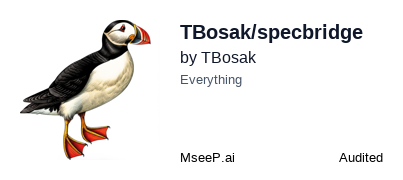GitHub Stars
4
User Rating
Not Rated
Favorites
0
Views
136
Forks
3
Issues
1
SpecBridge
An MCP server that turns OpenAPI specifications into MCP tools. Scan a folder for OpenAPI spec files and automatically generate corresponding tools. No configuration files, no separate servers - just drop specs in a folder and get tools.Built with FastMCP for TypeScript.
✨ Features
- 🎯 Zero Configuration: Filesystem is the interface - just drop OpenAPI specs in a folder
- 🔐 Auto Authentication: Simple
.envfile with{API_NAME}_API_KEYpattern - 🏷️ Namespace Isolation: Multiple APIs coexist cleanly (e.g.,
petstore_getPet,github_getUser) - 📝 Full OpenAPI Support: Handles parameters, request bodies, authentication, and responses
- 🚀 Multiple Transports: Support for stdio and HTTP streaming
- 🔍 Built-in Debugging: List command to see loaded specs and tools
🚀 Quick Start
1️⃣ Install (optional)
npm install -g specbridge
2️⃣ Create a specs folder
mkdir ~/mcp-apis
3️⃣ Add OpenAPI specs
Drop any .json, .yaml, or .yml OpenAPI specification files into your specs folder:
# Example: Download the Petstore spec
curl -o ~/mcp-apis/petstore.json https://petstore3.swagger.io/api/v3/openapi.json
4️⃣ Configure authentication (optional)
Create a .env file in your specs folder:
# ~/mcp-apis/.env
PETSTORE_API_KEY=your_api_key_here
GITHUB_TOKEN=ghp_your_github_token
OPENAI_API_KEY=sk-your_openai_key
5️⃣ Add to MCP client configuration
For Claude Desktop or Cursor, add to your MCP configuration:
If installed on your machine:
{
"mcpServers": {
"specbridge": {
"command": "specbridge",
"args": ["--specs", "/path/to/your/specs/folder"]
}
}
}
Otherwise:
{
"mcpServers": {
"specbridge": {
"command": "npx",
"args": ["-y", "specbridge", "--specs", "/absolute/path/to/your/specs"]
}
}
}
💻 CLI Usage
🚀 Start the server
# Default: stdio transport, current directory
specbridge
# Custom specs folder
specbridge --specs ~/my-api-specs
# HTTP transport mode
specbridge --transport httpStream --port 8080
📋 List loaded specs and tools
# List all loaded specifications and their tools
specbridge list
# List specs from custom folder
specbridge list --specs ~/my-api-specs
🔑 Authentication Patterns
The server automatically detects authentication from environment variables using these patterns:
| Pattern | Auth Type | Usage |
|---|---|---|
{API_NAME}_API_KEY |
🗝️ API Key | X-API-Key header |
{API_NAME}_TOKEN |
🎫 Bearer Token | Authorization: Bearer {token} |
{API_NAME}_BEARER_TOKEN |
🎫 Bearer Token | Authorization: Bearer {token} |
{API_NAME}_USERNAME + {API_NAME}_PASSWORD |
👤 Basic Auth | Authorization: Basic {base64} |
The {API_NAME} is derived from the filename of your OpenAPI spec:
petstore.json→PETSTORE_API_KEYgithub-api.yaml→GITHUB_TOKENmy_custom_api.yml→MYCUSTOMAPI_API_KEY
🏷️ Tool Naming
Tools are automatically named using this pattern:
- With operationId:
{api_name}_{operationId} - Without operationId:
{api_name}_{method}_{path_segments}
Examples:
petstore_getPetById(from operationId)github_get_user_repos(generated fromGET /user/repos)
📁 File Structure
your-project/
├── api-specs/ # Your OpenAPI specs folder
│ ├── .env # Authentication credentials
│ ├── petstore.json # OpenAPI spec files
│ ├── github.yaml #
│ └── custom-api.yml #
└── mcp-config.json # MCP client configuration
📄 Example OpenAPI Spec
Here's a minimal example that creates two tools:
# ~/mcp-apis/example.yaml
openapi: 3.0.0
info:
title: Example API
version: 1.0.0
servers:
- url: https://api.example.com
paths:
/users/{id}:
get:
operationId: getUser
summary: Get user by ID
parameters:
- name: id
in: path
required: true
schema:
type: string
responses:
'200':
description: User found
/users:
post:
operationId: createUser
summary: Create a new user
requestBody:
required: true
content:
application/json:
schema:
type: object
properties:
name:
type: string
email:
type: string
responses:
'201':
description: User created
This creates tools named:
example_getUserexample_createUser
🔧 Troubleshooting
❌ No tools appearing?
Check that your OpenAPI specs are valid:
specbridge list --specs /path/to/specsEnsure files have correct extensions (
.json,.yaml,.yml)Check the server logs for parsing errors
⚠️ Note: Specbridge works best when you use absolute paths (with no spaces) for the
--specsargument and other file paths. Relative paths or paths containing spaces may cause issues on some platforms or with some MCP clients.
🔐 Authentication not working?
- Verify your
.envfile is in the specs directory - Check the naming pattern matches your spec filename
- Use the list command to verify auth configuration:
specbridge list
🔄 Tools not updating after spec changes?
- Restart the MCP server to reload the specs
- Check file permissions
- Restart the MCP client if needed
🛠️ Development
# Clone and install
git clone https://github.com/TBosak/specbridge.git
cd specbridge
npm install
# Build
npm run build
# Test locally
npm run dev -- --specs ./examples
🤝 Contributing
Contributions are welcome! Please feel free to submit issues and pull requests.
17
Followers
38
Repositories
0
Gists
0
Total Contributions
GemSuite MCP is an open-source server designed for advanced interactions with the Gemini API. Utilizing the Model Context Protocol (MCP), it intelligently selects models to ensure optimal performance and minimal token costs, facilitating seamless integration. Built with TypeScript, it operates in a Node.js environment.
The AniList MCP Server is a Model Context Protocol (MCP) server that interfaces with the AniList API, allowing users to access and interact with data related to anime, manga, characters, staff, and users. It provides detailed information retrieval, search capabilities, and advanced filtering options for effective data management.
